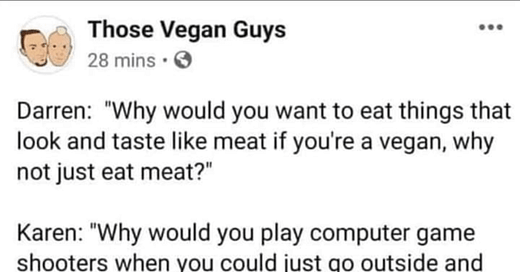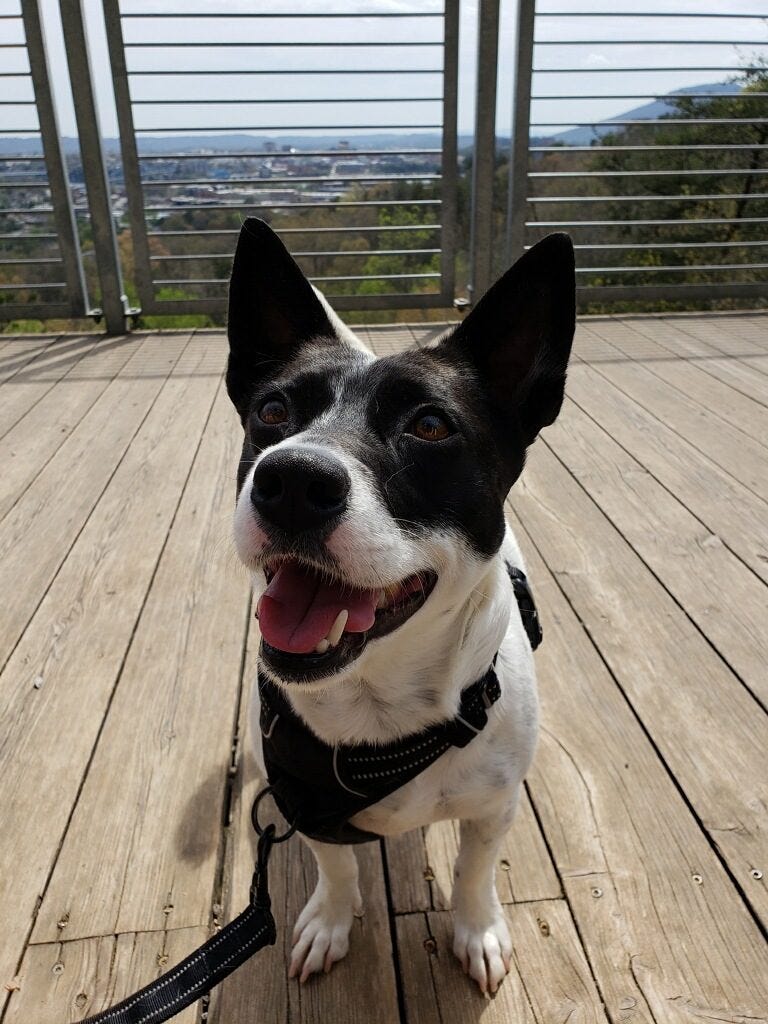Standard Arguments Against Veganism, Pt. 5
"There’s a time to die and a way to live."
-Nothing More,
"Tunnels"
1. It's all vegan propaganda
When's the last time you saw a vegan advertisement? Maybe the other day you saw a commercial on tv for the Impossible Whopper (not technically vegan, but I'll let it slide) or you saw an Oatly billboard. That's great. But when's the last time you saw a nonvegan advertisement? Probably much more recently and far more often.
What kind of food do they serve in schools? Do you have to put in a request in advance for the vegan food option at a work function? When's the last time you heard the government telling people to stop eating meat because in 2015 the World Health Organization -- not a vegan organization by any means -- labeled processed meat as a known carcinogen and all other meats as probable carcinogens?
Nonvegan food is one of the most heavily advertised products in the entire world, not even to mention all the zoos, aquariums, clothing, makeup, cleaning products, cars, furniture, and the gazillion other nonvegan things we take for granted as just a part of our society. When it comes to propaganda, you're not seeing ads for Gardein and farm animal sanctuaries; you're seeing ads for Wendy's and SeaWorld. There is no single vegan entity powerful enough to perpetuate "vegan propaganda," especially in comparison to the mega-giant carnist corporations.
2. Vegans eat meat-shaped foods
What is a "meat shape"? Because it seems most meat is just a vaguely circular blob. Animal meat doesn't have exclusive rights to be formed into circles and blobs; plants can do that too. Wouldn't a real "meat shape" be in the image of the animal from which it came? Why won't carnists eat chicken-shaped chicken flesh or piglet-shaped pork? Maybe nonvegans should become more acquainted with what their food actually looks like and how it's made, from start to finish.
Regardless, those "meat-shaped" plant-based foods are formed in that way to emulate foods we all are acquainted with eating, foods with which we’re familiar -- burgers, pizza, wings, deli meat, etc. It’s not because subconsciously we have some secret desire to eat animal flesh; it’s because we can continue to eat meat products without killing animals. For all intents and purposes, vegans and nonvegans eat the same things, but one kind of product causes undue suffering while the other doesn't.
3. They're just animals
The thing is that we're all animals. From the tiniest insects to the largest whales, we're all animals. So what is it about a pig that is so obscenely offensive that they deserve to die? And what is it about a dog that is so wonderful that they deserve our absolute devotion? There is no difference. It is only speciesism, the belief system that there is a hierarchy of value of life, with humans, of course, at the pinnacle of it all. But who are we to decide the value of another's life? Are we God? Because, if you believe in the teachings of the Bible, we are given dominion over the planet, just as God has dominion over us. But we wouldn't expect our benevolent and loving God to do to us what we do to chickens or tunas, would we?
A cow had no choice to be born a cow, just as you had no choice to be born a human. We're all just animals. As I made clear in "Cows vs. Dogs," there are differences between species, and those differences are the glorious aspects that make us all unique. Instead of using these insignificant dissimilarities to justify our wrongdoings and continue the slaughter, we should be celebrating the diversity of life this marvelous planet holds. This doesn't mean you have to love animals; it just means you respect their right to life enough not to take it away from them.
"Auschwitz begins wherever someone looks at a slaughterhouse and thinks: they’re only animals."
--Theodor Adorno
4. "Lalalala I can't hear you!"
The saying goes that ignorance is bliss. Maybe it is for a nonvegan, but that can only last so long. Right now, they might not be worrying about all the pain they cause by consuming animal products, but that doesn't mean they're not experiencing the negative symptoms of doing so -- and if not now, then certainly in the future. Probably every single person alive knew or knows someone suffering from heart disease, cancer, diabetes, Alzheimer's, and other diet-related diseases; maybe it's themselves. All the pain of suffering from these illnesses, the cost of treatments, the mental taxation of those around them. It all adds up, and at least 90 percent of these deaths from the most fatal illnesses to humankind would be completely prevented if we didn't eat animals.
Or maybe they suffer from environmental anxiety, worrying over greenhouse gas emissions and the exponential increase of species extinctions. But with 51 percent of total greenhouse gases emitted -- including methane, which is 25 to 100 times more destructive than CO2 -- created by animal agriculture, the fight against fracking pales in comparison.[1] Not to mention it's also the leading cause of species extinction, habitat destruction, water pollution, and ocean dead zones. Maybe they think they're doing everything they can to prevent the impending climate catastrophe and therefore don't need to do any more, but just one average vegan does far more good for the climate than even the most environmentally-conscious carnist.[2]
The only thing worse than ignorance is blatant disregard. You can pretend to hear and see no evil, but you're eating that evil three times a day whether you believe in it or not. And you're still suffering the consequences of those actions whether you know it or not.
5. Everybody's gotta die from something
It's true that we all must die someday, but that doesn't mean attempting to live a good life is futile. And it doesn't mean that in our quest for death we should be subjecting animals to die. What kind of world is it where we can be so blasé about killing animals, where we can shrug it off, say that's just how it is, and continue doing the same things regardless of the consequences? It's like I said in Pt. 3 that we, on some level, acknowledge eating animal products is bad for us. We know we eat terrible things that degrade our bodies, and yet we write ourselves off, as if we are utterly at the mercy of our stomach's will.
And similar to Pt. 4, some of this comes from the "I'm too old to change now" excuse. Whether you're old or young, what do you want your final months and years of existence on this earth to be? Would you prefer to be withering away, paralyzed with pain in a hospital bed, watching the agonized faces of your loved ones as they watch you die a little bit day after day? Even if you do unfortunately face that same fate, wouldn't you prefer to know that you did everything in your power to prevent that suffering -- for you and your family -- and that you stood up for the most exploited beings on the planet?
We all have to die from something. But it's better to have died after a purposeful life, as an individual, than as just another member of the herd.
6. Human rights > animal rights
While I would likely never be a human rights activist and I don't particularly empathize with humans the same way I do with nonhumans, that doesn’t mean I'm going to start farming, killing, and eating humans. It doesn't mean that I believe all humans don't deserve basic rights or that I would intentionally try to take those rights away.
The problem with this argument is that it gets blown out of proportion, made to seem like something much more radical than it is. When I say I believe in animal rights, I'm not saying my dog deserves a driver's license and the right to vote. Obviously, that's insane. But she does deserve basic rights of protection and freedom. That's something all animals deserve, regardless of species. They deserve the right to be born and live freely without human interference, and they deserve the right to be protected from discrimination and harm to both themselves and their habitat. When it's put that way, I don't think many people could really argue with that. Because most of us agree that animals deserve these rights -- and maybe even more than that. We champion elephant rescues and sea turtle conservatives; we often even go out of our way to not hurt animals, like when they dart in front of our car in the road or accidentally wander into our homes.
Another incredibly important note on this subject is that when you prioritize animal rights in your life, you're unintentionally benefiting humans. Because nonhuman animals are, literally, at the bottom of the food chain, with next to no legal rights. But once you stop hurting animals, you stop hurting yourself by no longer eating toxic foods. You're no longer forcing families into starvation so they can grow crops to feed to animals eaten in Western countries.[2] You're protecting the preservation of native Amazonians whose homes are being decimated so crops can be grown to feed to animals that are fed to humans. You're not paying for the enslavement of illegal workers brought into this country so they can slit throats every day at a slaughterhouse. Every single thing that happens on this planet is connected, and everything comes at a cost. We're privileged enough to not have to bear the burden of those costs, but we have to decide if our comfort is worth the price that other humans have to pay.
be conscious, be kind, be vegan
The Whole Series
"Standard Arguments Against Veganism, Pt. 1"
"Standard Arguments Against Veganism, Pt. 2"
"Standard Arguments Against Veganism, Pt. 3"
"Standard Arguments Against Veganism, Pt. 4"
References
[1] "He Schooled Me On Climate Change | Dr. Sailesh Rao Interview"





